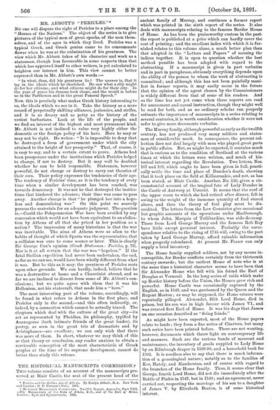THE HISTORICAL MANUSCRIPTS COMMISSION.t Tars volume consists of an account
of the manuscripts pre- served at Blair Castle, the seat of the present head of the
* Pericles and the Golden Age of Athens. By Evelyn Abbott, M.A. New York and London : G. P. Putnam'e Sons. 1891.
t Hi,torical Manuscripts Commission. Twelfth Report, Appendix, Part —The Manuscripts of the Duke of Athole, LT., and of the Earl of Hants. London: Eyre and Bpottiswoode. 1891.
ancient family of Murray, and continues a former report which was printed in the sixth report of the series. It also deals with manuscripts relating to the famous Border House of Home. As has been the praiseworthy custom in the past, the report is published at a price which can hardly cover the cost of printing ; and the excellent index with which it is fur- nished relates to this volume alone, a much better plan than that adopted in the "Letters and Papers" of massing the indices together. It is open to question whether the beat method possible has been adopted with regard to the abstracting. If a manuscript is given in part verbatim and in part in paraphrase, obviously everything depends upon the ability of the person to whom the work of abstracting is committed ; and although this has not been painfully mani- fest in former reports, it may easily occur in the future that the opinion of the agent chosen by the Commissioners is widely different from that of some of his readers. And as the time has not yet come when these reports are read for amusement and casual instruction, though they might well be read for both, and as no ordinary scholar can properly estimate the importance of manuscripts in a series relating to several centuries, it is worth consideration whether it were not safer to give more documents verbatim.
The Murray family, although powerful as early as the twelfth century, has not produced very many soldiers and states- men of considerable mark. In consequence, the present col- lection does not deal largely with men who played great parts in public affairs. But, as might be expected, it contains much that is curious as to the condition of Scotland at the various times at -which the letters were written, and much of his- torical interest regarding the Revolution. Two letters, Nos. 107 and 108, which ought to have been given in full, practi- cally settle the time and place of Dundee's death, showing that it took place on the field at Killiecrankie, and not, as has been stated, at Blair Castle. Another, No. 126, gives a cir- cumstantial account of the tragical fate of Lady Dundee in the Castle of Antwerp at Utrecht. It seems that the roof of the upper room to which she had retired after dinner, fell in owing to the weight of the immense quantity of fuel stored above, and thus the theory of foul play must be dis- credited. The letters from the Low Countries give occasional but graphic accounts of the operations under Marlborough, to whom John, Marquis of Tullibaidine, was aide-de-camp. Those from Lord George Murray and the famous Rob Roy have little except personal interest. Probably the corre- spondence relative to the rising of 1745 will, owing to the part taken by Lord George Murray, afford valuable information when properly calendared. At present Mr. Fraser can only supply a brief inventory.
The Home family supplied soldiers, not by any means in- corruptible, for Border conflicts certainly from the thirteenth century onwards ; but the earliest Home of note who is at the same time a historical character seems to have been that Sir Alexander Home who fell with his friend the Earl of 'Douglas at Verneuil. In the long series of raids which make up-Border history before the Union, the Homes grew rich and powerful. Home Castle was occasionally captured by the English, as in 1548, and was garrisoned by the Queen and the Regent Morton ; as may be supposed, the Home estates were repeatedly pillaged. Alexander, fifth Lord Home, died in prison, but his son was in high favour with James VI., and was created first Earl of Home. It was his-dogs that James on one occasion described as " fleing feinds."
As might have been expected, most of the Home papers relate to lands ; they form a fine series of Charters, but many such series have been printed before. There are not wanting, however, documents which throw light on contemporary life and manners. Such are the various bonds of manrent and maintenance, the inventory of goods supplied to Lady Home by an Edinburgh draper in 1589-90, and a household book for 1592. It is needless also to say that there is much informa- tion of a genealogical nature ; notably as to the families of Ker, Hately, and Manderston, and of course with regard to the branches of the Home family. Thus, it seems clear that George, fourth Lord Home, did not die immediately after the Battle of Pinkie in 1547, but in 1549; and an agreement, never carried out, respecting the marriage of his son to a daughter of James V. by Elizabeth Beaton, is of some historical interest.


































 Previous page
Previous page